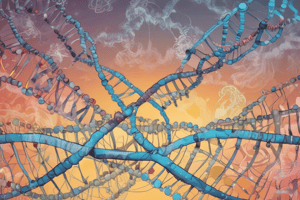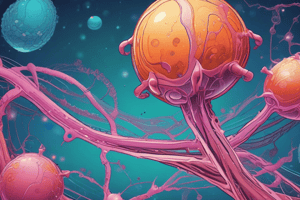Podcast
Questions and Answers
What is the role of tumor suppressor genes in cancer development?
What is the role of tumor suppressor genes in cancer development?
- Promote uncontrolled cell proliferation
- Prevent apoptosis in damaged cells
- Activate oncogenes
- Regulate cell growth and division (correct)
How does the loss of function of tumor suppressor genes contribute to cancer development?
How does the loss of function of tumor suppressor genes contribute to cancer development?
- Allows cells to grow uncontrollably (correct)
- Inhibits cell growth
- Promotes apoptosis in damaged cells
- Prevents genetic alterations
What is the impact of inactivating tumor suppressor genes on oncogenes?
What is the impact of inactivating tumor suppressor genes on oncogenes?
- Inhibits cellular homeostasis
- Inactivation prevents tumor formation
- Activates oncogenes to promote cell growth (correct)
- Inactivation promotes apoptosis
How do drugs like pembrolizumab and nivolumab contribute to cancer treatment?
How do drugs like pembrolizumab and nivolumab contribute to cancer treatment?
What innovative treatment options are possible by restoring the function of tumor suppressor genes?
What innovative treatment options are possible by restoring the function of tumor suppressor genes?
Flashcards are hidden until you start studying
Study Notes
Understanding Cancer Development through Loss of Function
Cancer is a complex disease driven by genetic alterations that disrupt the normal functions of cells within our bodies. One of the key mechanisms behind cancer development is the loss of function, which refers to the inactivation or impairment of genes that are vital for maintaining healthy cell behavior. To grasp this concept better, let's delve into the intricacies of loss of function in cancer development.
Cellular Functions and Homeostasis
To comprehend loss of function, we must first appreciate the role of genes in maintaining cellular functions and homeostasis. Cells have specific genes that ensure proper growth, division, and programmed cell death (apoptosis). When a cell loses the ability to carry out these processes effectively, it can lead to uncontrolled cell growth and potentially cancer.
Loss of Function in Cancer
Loss of function can arise due to multiple reasons, such as:
- Mutations: Spontaneous errors in DNA replication can lead to mutations in genes that play a crucial role in preventing cancer. For example, a mutation in one of the tumor suppressor genes TP53 can inactivate its ability to regulate cell growth and prevent uncontrolled proliferation.
- Epigenetic changes: Alterations in how genes are regulated can also lead to loss of function. For example, DNA methylation and histone modifications can silence tumor suppressor genes, making them inactive.
- Chromosomal alterations: The loss or gain of entire chromosomes or specific regions of a chromosome, known as structural alterations, can disrupt the function of tumor suppressor genes.
Tumor Suppressor Genes
Tumor suppressor genes (TSGs) are a class of genes that regulate cell growth and division. They help maintain cellular homeostasis by preventing uncontrolled cell proliferation and promoting apoptosis in damaged or abnormal cells. Some well-known tumor suppressor genes include:
- TP53: This gene is involved in cell cycle regulation, DNA repair, and apoptosis, making it a critical guardian against cancer.
- BRCA1/2: These genes are involved in DNA repair and prevention of genomic instability.
- CDKN2A: This gene controls cell cycle progression and inhibits cell growth.
- PTEN: This gene regulates cell growth, cell survival, and cell migration.
Loss of Function and Cancer Development
When tumor suppressor genes are inactivated or impaired due to mutations, epigenetic changes, or chromosomal alterations, the ability of these genes to regulate cell growth is compromised. This loss of function contributes to the development of cancer by allowing cells to grow uncontrollably and evade apoptosis.
Cells with inactive tumor suppressor genes can acquire additional genetic alterations, leading to the activation of oncogenes (genes that promote cell growth) and the formation of tumors. This multistep process is now recognized as the basic model of cancer development.
Loss of Function and Cancer Treatment
Understanding loss of function in cancer development has paved the way for innovative therapies targeting these defects. For example, drugs like pembrolizumab and nivolumab are immune checkpoint inhibitors that block the activity of proteins that inactivate the immune system's ability to recognize and attack cancer cells. Restoring the function of these tumor suppressor genes or inhibiting the proteins that inactivate them can offer new treatment options for cancer patients.
In conclusion, loss of function in cancer development is a critical concept that helps us understand the mechanisms behind the uncontrolled growth of cancer cells. The discovery and research into tumor suppressor genes and loss of function have provided valuable insights into novel cancer therapies. As our understanding of the intricate pathways that govern cellular homeostasis continues to grow, we can anticipate new and innovative treatments for cancer in the future.
Studying That Suits You
Use AI to generate personalized quizzes and flashcards to suit your learning preferences.




